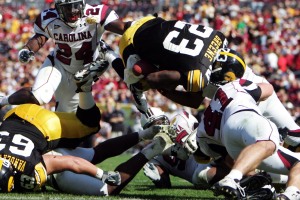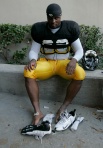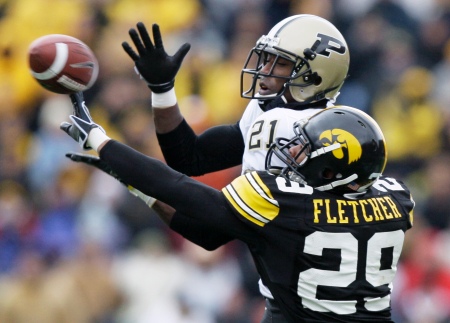
Iowa's Shonn Greene flips into the end zone for a touchdown during the second quarter of the Outback Bowl at Raymond James Stadium in Tampa, Fla., Jan. 1, 2009. (Jonathan D. Woods/ The Gazette)
IOWA CITY — Shonn Greene unanimously was declared the nation’s best running back last fall.
He won the Doak Walker Award, which annually is given to college football’s best running back. He was named the Big Ten Offensive Player of the Year. He was a consensus All-American.
Greene, 23, finished with 1,850 yards and 20 touchdowns, both school records at Iowa. He ran for at least 100 yards in all 13 Iowa games last season and combined both speed and power rarely found in collegiate running backs.
“He’s fast, and he’s big, and he’s a pro,” said former Purdue defensive coordinator Brock Spack, who now is the head coach at Illinois State. “He’s the best back in this conference — bar none. There’s no contest.”
Greene’s college accolades have failed to vault him into the NFL first-round draft discussion. Whether it’s his size (5 feet, 9 inches, 227 pounds), a year of academic ineligibility, only one proven collegiate season or difficulty catching the ball out of the backfield, someone always has something negative to say about Greene.
“I like his running skills. I wish he were a better receiver,” ESPN draft analyst Mel Kiper Jr. said. “Catching the football out of the backfield is something he needs to work. If he was a little more complete, he’d be guaranteed a second-round pick.”Kiper lists Greene anywhere from the NFL draft’s second through fourth rounds. Dan Shonka, general manager and national scout for Ourlads Scouting Service, LLC., lists Greene as the fourth-best running back entering the draft.
Like Kiper, Shonka is concerned about Greene’s pass-catching skills. But Greene’s downhill running style and experience of running the ball in a zone-blocking scheme could elevate him into the second round.
“A lot of teams run a zone-blocking scheme, and Shonn is perfect because that’s what they teach at Iowa,” Shonka said. “The offensive line is taught pro techniques at Iowa. Shonn is a downhill one-cut runner, so he’s going to fit in a lot of different schemes.
“Obviously, I think the thing that concerns people about Shonn is his ability to block and to catch ball out of the backfield. But they just didn’t throw it to him a lot. And when they did, he kind of fumbled it or double caught it, or he wasn’t smooth catching the ball.”
Greene caught eight passes for 49 yards last season.
In February, Greene struggled in measurable categories at the NFL Combine. He ran the 40-yard dash in 4.66 seconds, but then cut that time to anywhere from 4.59 to 4.50 seconds at Iowa’s pro day, depending on the stopwatches. He also increased his 225-pound bench press repetitions from 19 at the NFL Combine to 23 at Iowa’s pro day.
“I feel like I had a very good day,” Greene said after his pro day workout. “I did everything better than I did at the combine. I ran faster, lifted more reps with the bench, did pro agility faster. I think I did pretty good, caught the ball well.”

Iowa running back Shonn Greene removes athletic wrap from his feet after practice at the University of Tampa on Dec. 26, 2008, in Tampa. (Jim Slosiarek/The Gazette)
Shonka slotted Greene as a second-round pick to Houston and provide a 1-2 punch with second-year running back Steve Slaton. Kiper raved about Greene’s intangibles when running the football.
“Greene, I think, is a running back,” Kiper said. “You like his determination. I like the low center of gravity, the way he ran with power between the tackles, good balance as well. I like his running skills; I wish he were a better receiver.”
Greene, a junior last season, was ruled academically ineligible for the 2007 season and went to Kirkwood Community College to regain his eligibility. He was on pace to graduate before he declared to enter the NFL draft.
Greene shrugs off the experts’ criticism and instead points to his production last year.
“If you look at the stats and all that, it will tell you that I’m the top back,” Greene said. “You look at some of those guys that I went head-to-head with and some of them I faced the same defense, and I did much better. I’m not worried about that. Whoever takes me is going to get a good running back.”



 Posted by scottdo
Posted by scottdo 




